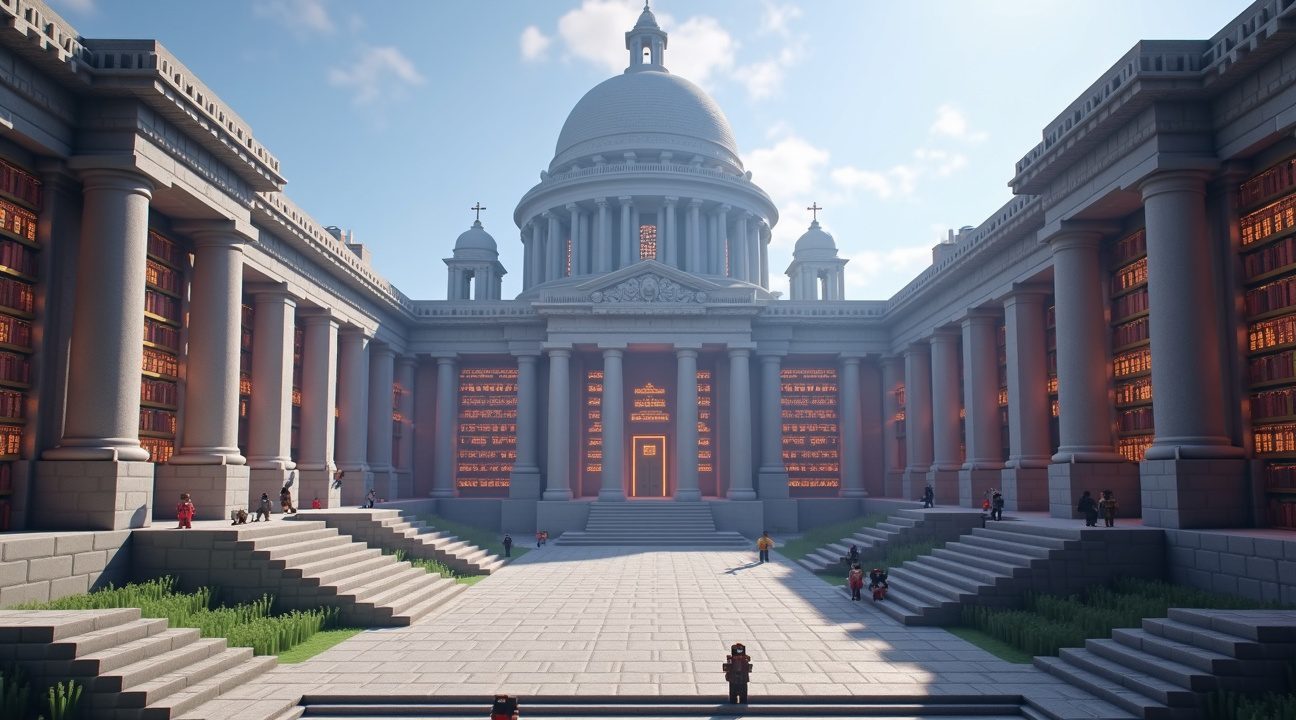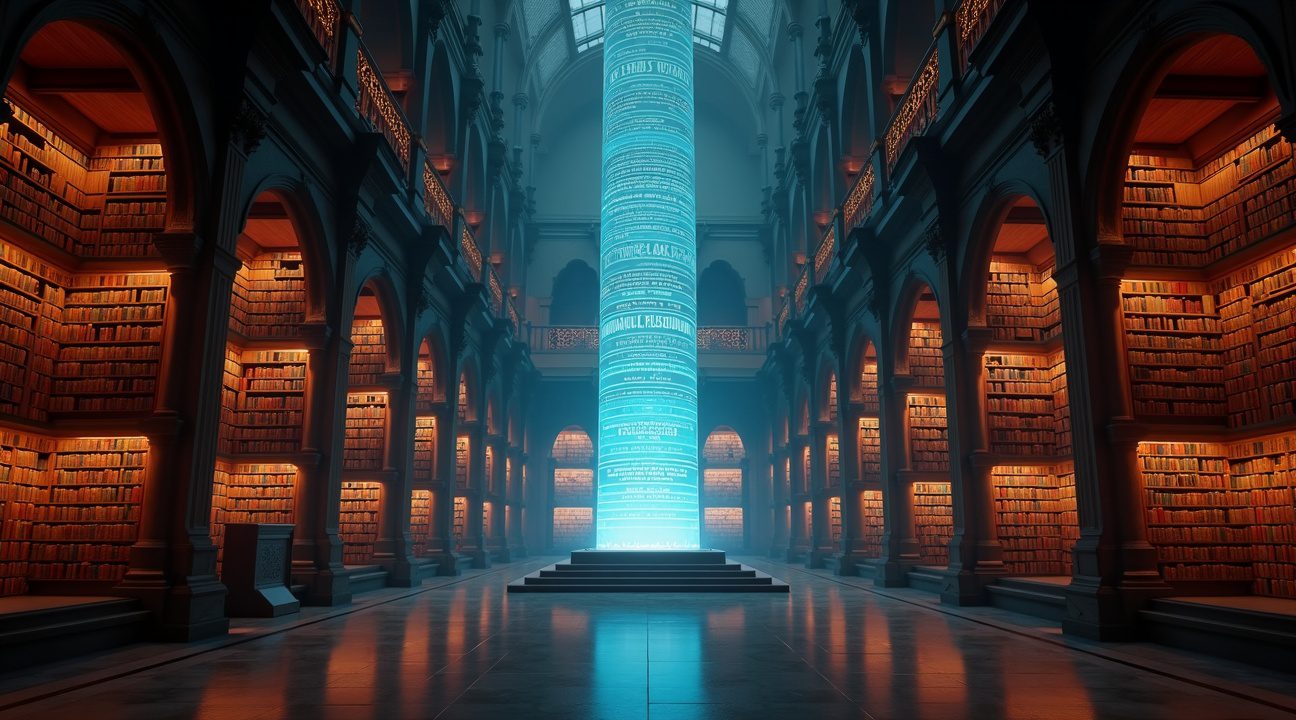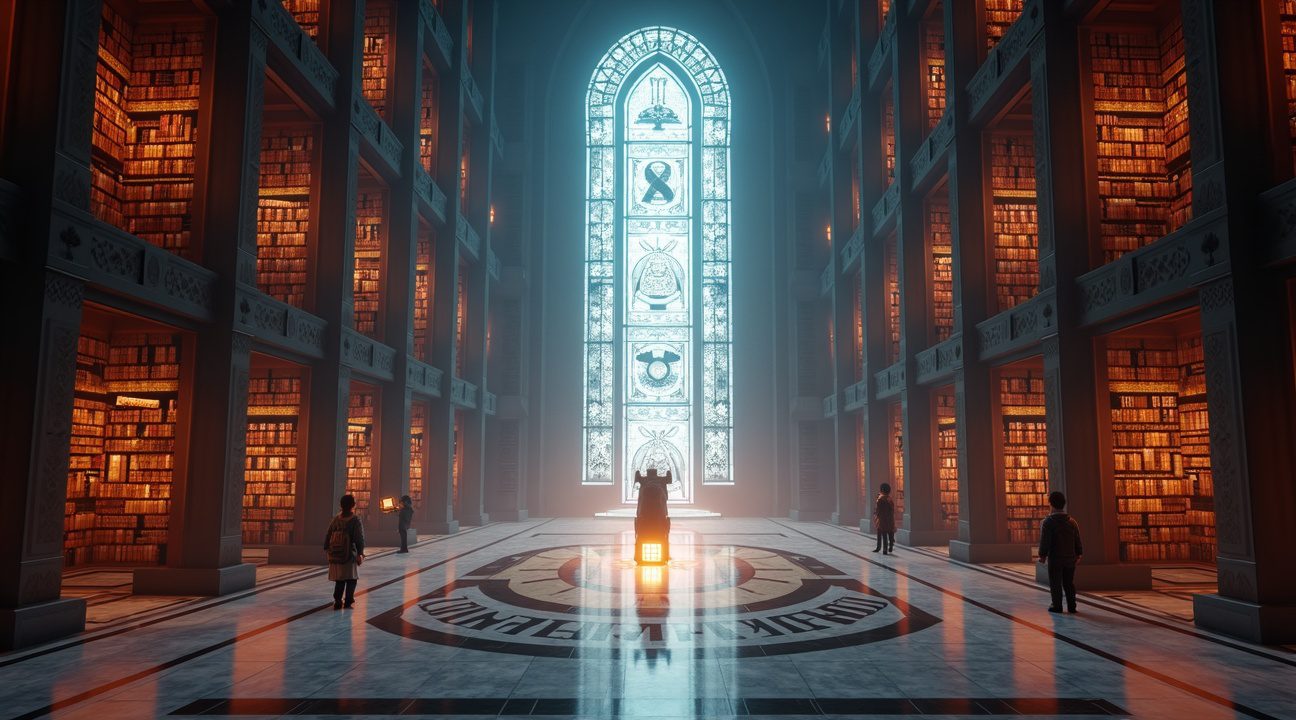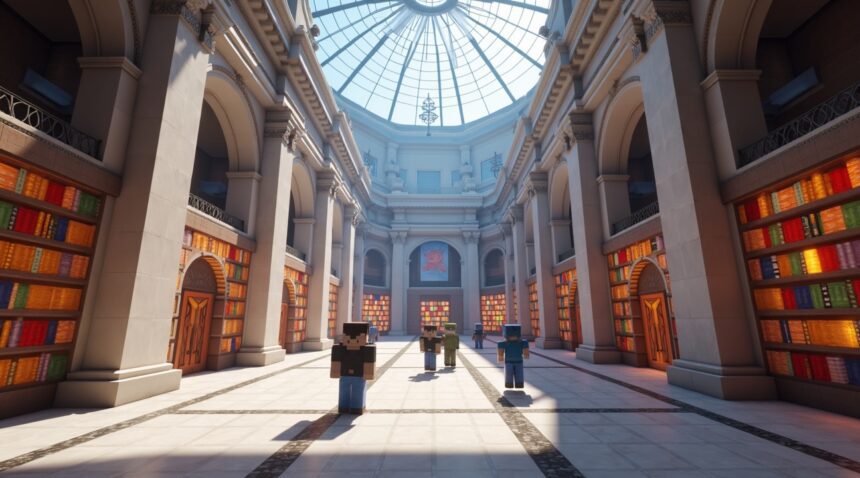The Uncensored Library stands as a revolutionary fusion of gaming technology and press freedom advocacy. This digital sanctuary houses over 300 banned articles and reports from nine countries within a massive Minecraft structure built from 12.5 million blocks.
Key Takeaways
- Strategic Gaming Platform Choice: The library exploits a critical oversight in government censorship systems by using Minecraft, which remains accessible in countries where news websites and social media face heavy restrictions.
- Massive International Construction: Twenty-four builders from 16 countries collaborated for over 250 hours to create a neoclassical structure spanning nearly 300 meters, making it one of the largest virtual domed buildings ever constructed.
- Comprehensive Content Collection: The library contains banned journalism from Egypt, Mexico, Russia, Saudi Arabia, Vietnam, Brazil, Belarus, Iran, and Eritrea, along with memorial spaces honoring murdered journalists and COVID-19 era press restrictions.
- Multiple Access Methods: Visitors can explore the library through the Minecraft server at visit.uncensoredlibrary.com, download the complete map for offline use, or take a 360-degree web browser tour without needing gaming software.
- Global Recognition and Impact: The project earned the prestigious 2022 Peabody Award in the Interactive category, validating gaming platforms as legitimate venues for serious journalistic work and press freedom advocacy.
This virtual monument demonstrates how creative thinking can overcome digital barriers. Governments that heavily monitor traditional media platforms often ignore gaming environments. This oversight creates a perfect opportunity for press freedom advocates to preserve and share censored content.
Collaborative Construction
The library’s construction involved an unprecedented level of international cooperation. Builders worked across time zones and languages to create something larger than any single organization could achieve. Each contributor brought unique skills and perspectives from their home countries, making the final structure truly representative of global collaboration.
Content Curation and Integrity
Content curation required careful selection and verification processes. Organizers partnered with established journalism organizations to ensure accuracy and credibility. Each article underwent review before inclusion, maintaining the same editorial standards expected from traditional news outlets.
Accessibility and User Experience
Technical accessibility remains a priority throughout the project’s development. Multiple access points ensure users can reach the content regardless of their technical expertise or available resources. The web browser option eliminates barriers for those without gaming experience or Minecraft access.
Recognition and Influence
Recognition from the Peabody Awards validates gaming platforms as serious tools for journalistic preservation. This acknowledgment opens doors for similar projects and encourages news organizations to explore alternative distribution methods. The award also brings mainstream attention to digital preservation efforts in authoritarian countries.
Ongoing Expansion
The library continues expanding its collection and reach. New partnerships with journalism organizations worldwide provide fresh content and broader representation. Technical improvements enhance user experience while maintaining security and accessibility standards.
Conclusion
This project proves that innovation can emerge from necessity. When traditional channels close, creative alternatives can preserve democratic values and press freedom. The Uncensored Library stands as proof that determined individuals can build something meaningful, even within the constraints of authoritarian oversight.
The Birth of Digital Resistance: The Uncensored Library’s Strategic Launch
The Uncensored Library emerged on March 12, 2020, as a groundbreaking collaboration between Reporters Without Borders (RSF), BlockWorks, DDB Germany, and MediaMonks. This innovative project transformed Minecraft into something far beyond entertainment—it became a sanctuary for press freedom in countries where media faces severe restrictions.
Strategic Partnership Behind the Revolution
The partnership brought together diverse expertise to create this digital fortress of information. Reporters Without Borders provided the journalistic content and press freedom advocacy, while BlockWorks contributed their exceptional Minecraft building capabilities. DDB Germany handled the campaign strategy, and MediaMonks managed the technical implementation. Each organization played a crucial role in transforming this concept from an ambitious idea into a functional reality.
The collaboration deliberately chose Minecraft for its strategic advantages. Gaming platforms often fly under the radar of government censors who focus primarily on traditional news websites and social media platforms. This oversight created an opportunity to establish a new pathway for information distribution in countries where accessing independent journalism carries significant risks.
Circumventing Censorship Through Gaming Innovation
The library’s creators recognized that authoritarian regimes typically concentrate their censorship efforts on obvious targets. News websites get blocked, social media platforms face restrictions, and traditional communication channels become heavily monitored. However, gaming platforms like Minecraft frequently remain accessible because governments don’t immediately recognize their potential as information distribution tools.
The campaign hashtag #TruthFindsAWay perfectly captures this philosophy. Truth doesn’t just find a way—it creates new pathways when traditional routes become blocked. The initiative demonstrates how creative problem-solving can overcome even the most restrictive information controls.
Players in censorship-heavy countries can access the library simply by downloading Minecraft and joining the specific server. Once inside, they discover a massive neoclassical building filled with virtual books containing real journalism. Articles from banned publications, investigative reports that journalists risked their lives to produce, and press freedom documentation all exist within this digital space.
The library houses content from multiple countries where press freedom faces severe challenges. Visitors can read articles originally published by journalists who faced persecution, imprisonment, or worse for their reporting. Minecraft’s ability to honor important causes extends beyond entertainment into real-world impact.
Each virtual book represents actual banned content, carefully curated to ensure accuracy and relevance. The library doesn’t just preserve these articles—it makes them accessible to people who previously had no way to read independent journalism. Citizens living under oppressive regimes can now access information their governments don’t want them to see, all through a gaming platform that appears harmless on the surface.
The timing of the March 2020 launch proved particularly significant. As the global pandemic forced people to spend more time online, digital platforms became even more important for information access. The library provided a new avenue for press freedom precisely when traditional media faced increasing pressure in many countries.
The project’s success lies in its simplicity and accessibility. Users don’t need special software, VPN connections, or technical expertise. They simply need Minecraft, which millions of people already own and use regularly. This approach democratizes access to censored information, making it available to anyone with basic gaming capabilities.
The Uncensored Library represents more than just a clever workaround—it establishes a new model for information resistance. By housing real journalism within a virtual environment, the project proves that press freedom advocates can adapt and evolve their strategies to match changing technological landscapes and censorship tactics.
https://www.youtube.com/watch?v=_Qvv_T3b8kM
12.5 Million Minecraft Blocks Form a Monument to Press Freedom
The Uncensored Library stands as a remarkable testament to both architectural ambition and human rights advocacy, constructed entirely within Minecraft’s virtual environment. This massive digital monument transforms traditional gaming into a powerful tool for press freedom activism, demonstrating how creative collaboration can transcend geographical boundaries.
Architectural Grandeur Meets Digital Innovation
I find the sheer scale of this construction absolutely breathtaking. Twenty-four builders from 16 different countries invested more than 250 hours of collaborative effort to place over 12.5 million Minecraft blocks into this extraordinary structure. The builders drew inspiration from grand neoclassical architecture, specifically emulating the design principles found in major global public institutions like the New York Public Library.
The centerpiece of this virtual monument is its massive dome, which stretches nearly 300 meters across. This dimension makes it one of the largest domed structures of its kind anywhere—whether in physical or virtual space. The architects deliberately chose this imposing scale to create visual impact and convey the importance of the information housed within its digital walls.
The aesthetic choices weren’t made randomly. The design team specifically selected neoclassical elements because these architectural features have historically symbolized knowledge, culture, and democratic freedoms. Libraries, courts, and government buildings around the world have employed similar design languages to communicate permanence, authority, and public access to information.
Symbolic Architecture Repurposed for Liberation
What makes this project particularly compelling is how it transforms authoritarian architectural aesthetics into symbols of liberation. The grand columns, imposing facades, and monumental scale typically associated with state power become tools for resistance against censorship. I appreciate how this inversion challenges traditional power structures by using their own visual language against them.
The building serves both symbolic and practical purposes in global press freedom activism. Visually, it commands respect and attention—qualities essential for drawing international focus to censorship issues. Functionally, it provides a secure platform for accessing banned journalism and documentation from countries where media freedom faces severe restrictions.
This architectural approach connects directly to gaming culture’s tradition of creating meaningful spaces. Minecraft honors Technoblade with tribute in their game, showing how the platform consistently serves as a canvas for commemoration and advocacy beyond entertainment.
The collaborative nature of the construction process itself represents democratic principles in action. Builders from different continents worked together without central authority dictating every detail, mirroring the kind of free exchange of ideas that the library itself promotes. Each contributor brought unique perspectives and skills, creating something far greater than any individual could achieve alone.
The project’s success demonstrates how virtual spaces can carry real-world significance. The library doesn’t just store information—it makes a statement about the importance of press freedom through its very existence. Every block placed represents a small act of defiance against censorship, while the completed structure stands as a monument to collective resistance.
The technical achievement alone deserves recognition. Coordinating 24 builders across multiple time zones and languages required sophisticated project management and shared vision. The fact that they completed such an ambitious build proves that meaningful activism can emerge from gaming communities when properly organized and motivated.
The Uncensored Library’s architectural magnificence serves a purpose beyond aesthetics. It legitimizes the content within by housing it in a structure that commands respect and attention. This approach helps ensure that visitors treat the materials seriously rather than dismissing them as mere gaming content.

Nine Countries’ Banned Journalism Now Lives in Virtual Bookshelves
Inside this virtual sanctuary, visitors discover over 300 carefully curated in-game books distributed across twelve distinct architectural wings. Each wing represents a featured country, plus one dedicated space for Reporters Without Borders (RSF) itself. The main featured nations include Egypt, Mexico, Russia, Saudi Arabia, Vietnam, Brazil, Belarus, Iran, and Eritrea.
Country-Specific Collections and Memorial Spaces
Additional specialized rooms showcase content from Myanmar, China, North Korea, Hungary, Thailand, and Turkmenistan. Many of these sections include vital information about COVID-19-era press freedom restrictions that emerged during the pandemic. The virtual books contain censored journalistic articles presented in both their original languages and English translations, making the content accessible to a global audience.
Critical topics covered throughout the collection include:
- State propaganda campaigns and disinformation efforts
- Unjust persecution of journalists and media workers
- Government censorship tactics and restrictions
- Human rights violations documented by independent reporters
The library prominently features human rights stories that have been silenced in their home countries. Visitors can read about the murder of Mexican journalist Javier Valdez, explore content from the blocked Egyptian publication Mada Masr, and discover suppressed works by Russian and Vietnamese dissidents. These stories provide firsthand accounts of what happens when press freedom disappears.
Some areas function as powerful digital memorials honoring journalists who lost their lives while pursuing truth. These memorial spaces transform what could be sterile documentation into deeply personal tributes that connect visitors with the human cost of censorship. Minecraft honors these fallen journalists through interactive exhibits that tell their stories.
RSF’s World Press Freedom Index sits prominently within the collection, offering visitors current information about journalism conditions worldwide. This index provides context for understanding how press freedom varies dramatically between nations and helps visitors grasp the global scope of media suppression.
Each wing’s architectural design reflects cultural elements from its respective country while maintaining the grand library aesthetic. This approach creates an immersive experience where visitors don’t just read about censorship—they experience walking through spaces that represent the very countries where these restrictions exist. The combination of architectural storytelling and preserved journalism creates a unique educational environment that makes abstract concepts of press freedom tangible and immediate.
https://www.youtube.com/watch?v=dXRQ2WPLH0k

Censored Articles Become Unchangeable Digital Books Hidden from Government Surveillance
The library transforms censored journalistic content into unchangeable digital books within the Minecraft environment, creating an innovative workaround for government surveillance systems. These in-game books function as immutable records that preserve the original text exactly as journalists intended, without any possibility of alteration or manipulation by external forces.
Unlike traditional censorship circumvention tools that governments actively monitor and block, this approach exploits a significant oversight in surveillance systems. Minecraft remains freely accessible in numerous restrictive countries, including Egypt where over 500 websites face blocking, and Vietnam where authorities maintain tight control over online content. This accessibility stems from the fact that authoritarian regimes don’t typically view gaming platforms as serious threats to their information control strategies.
The library operates through what amounts to a digital loophole. Government filtering systems that scan for specific keywords, domains, or content types simply don’t recognize the threat posed by books embedded within a seemingly innocent gaming environment. Citizens can access previously banned articles, investigative reports, and press freedom documentation without triggering the sophisticated monitoring systems that would normally flag such activity.
Global Recognition and Expanding Impact
The project’s innovative approach to information preservation earned significant recognition within media and technology circles. The library captured global media attention almost immediately after its launch, spreading rapidly across social media platforms as users shared their amazement at this creative solution to censorship. The 2022 Peabody Award in the Interactive category recognized the library’s groundbreaking contribution to press freedom and digital innovation.
I’ve observed how the library continues to evolve as censorship tactics become more sophisticated. New articles and reports from additional countries join the collection regularly, ensuring that fresh content remains available to users who might otherwise have no access to independent journalism. This ongoing expansion demonstrates the project’s commitment to staying ahead of evolving censorship strategies.
The stability this method provides proves especially valuable compared to other circumvention tools:
- VPNs face constant blocking attempts.
- Encrypted messaging apps frequently get banned.
- Minecraft remains freely accessible, providing a low-profile method of sharing information.
The preservation aspect carries particular importance for journalists and researchers. Once content gets converted into these digital books, it becomes permanently archived within the game environment. This creates an unchangeable historical record that survives even when original articles disappear from the internet due to government pressure or website shutdowns.
Citizens in countries with heavy internet restrictions now have access to investigative journalism, human rights reports, and press freedom documentation that would typically remain completely inaccessible. The gaming platform’s widespread acceptance provides cover for this information exchange, allowing users to explore content without the fear that typically accompanies accessing banned materials.
The project represents a significant shift in how activists and journalists think about information preservation and distribution. Rather than fighting censorship head-on through technical means that governments can easily counter, this approach uses the blind spots in surveillance systems to create sustainable access to critical information. The library’s success demonstrates that sometimes the most effective solutions come from thinking outside traditional frameworks and finding unexpected pathways through restrictive systems.
https://www.youtube.com/watch?v=y4FfQ2cNdCo
Anyone Can Visit the Library Through Minecraft or Web Browser
The Uncensored Library opens its digital doors to anyone with an internet connection. Players can explore this massive repository of censored journalism by connecting to the public Minecraft server at visit.uncensoredlibrary.com, providing instant access without special permissions or complicated setup procedures. Those who prefer offline exploration can download the complete map for use in Minecraft Java Edition, allowing them to browse at their own pace without server limitations.
Minecraft players aren’t the only ones who can experience this virtual sanctuary. The project creators developed an interactive, 360-degree web walkthrough hosted on the official website, giving non-gamers a comprehensive tour of the facility. This browser-based option removes technical barriers and expands access to anyone curious about the collection, regardless of their gaming experience or device capabilities.
Protection and Language Features
Security measures protect the integrity of every article and report housed within the library’s virtual walls. While visitors can read any book they discover, they cannot modify the contents, ensuring that censored journalism remains authentic and unaltered. This read-only access preserves the original reporting while allowing unlimited distribution through the gaming platform.
Language accessibility remains a core priority for the library’s mission. The project provides articles in both English translations and their original publication languages, accommodating diverse audiences and maintaining the authentic voice of each journalist. Key features that enhance the visitor experience include:
- Multiple language options for broader international access
- Read-only protection preventing content tampering
- Cross-platform availability through game servers and web browsers
- Downloadable maps for offline exploration
- Interactive virtual environment that mimics real library spaces
The gaming platform itself creates an additional layer of security that traditional websites cannot match. By housing sensitive journalism within Minecraft’s infrastructure, the library circumvents many censorship mechanisms that governments use to block direct access to independent news sources. This innovative approach transforms a popular video game into a protected gateway for forbidden information, making it significantly harder for authorities to prevent access to critical reporting.
I’ve found that this dual-access approach serves different user preferences effectively. Technical users often prefer the full Minecraft experience with its immersive environment and social features, while casual visitors appreciate the straightforward web browser option. Minecraft honors free speech by providing this unique platform for preserving journalism that might otherwise disappear.
The library’s creators designed the system to function regardless of local internet restrictions. Even in regions where news websites face blocking or throttling, the Minecraft server often remains accessible through gaming networks that authorities overlook. This technical advantage gives citizens in censored countries a reliable method for accessing independent journalism that governments prefer to suppress.
Browser-based exploration offers immediate gratification for curious visitors who want to understand the project without downloading software or creating accounts. The 360-degree walkthrough captures the impressive architecture while providing clickable access to the same articles available to Minecraft players. This parallel access ensures that technical barriers never prevent someone from discovering important stories that deserve global attention.
https://www.youtube.com/watch?v=mvSfr2DVk-I
Global Recognition Marks Cultural Impact of Digital Press Freedom Innovation
The Uncensored Library’s innovative approach to combating censorship has earned significant international acclaim, most notably receiving the prestigious 2022 Peabody Award in the Interactive category. This recognition validates the groundbreaking strategy of using gaming platforms as vehicles for press freedom advocacy, demonstrating how creative collaboration can produce meaningful solutions to global information restrictions.
Award-Winning Innovation in Digital Advocacy
The Peabody Award acknowledgment represents more than just industry recognition—it signals a broader acceptance of gaming as a legitimate medium for serious journalistic and cultural work. The award committee’s decision highlights how effective partnerships between NGOs, digital agencies, and game developers can create powerful tools for social change. This collaboration model has proven that unconventional approaches to press freedom can reach audiences traditional media might never access.
The library’s strategic launch on March 12, 2020—World Day Against Cyber Censorship—wasn’t coincidental. This timing emphasized the global commitment to fighting information repression and positioned the project as part of a worldwide movement. The choice of date reinforced the initiative’s serious intent while leveraging Minecraft’s existing user base to amplify the message about press freedom.
Expanding Repository of Uncensored Content
The scope of The Uncensored Library continues to grow, now housing over 300 digital books across twelve themed wings that represent nine primary countries. These wings contain carefully curated content from regions where traditional media faces severe restrictions. Additionally, the library has expanded to include materials related to pandemic-era shutdowns, acknowledging how global events can create new forms of censorship and information control.
The construction of this virtual monument to press freedom required extraordinary international cooperation.
- 24 builders
- 16 nations
- Over 250 hours of design and construction
This massive collaborative effort demonstrates the global nature of both censorship challenges and the determination to address them through innovative means.
Each wing of the library serves as a testament to specific regional struggles with media freedom. Visitors can access content that might be completely unavailable in certain countries, effectively bypassing geographic and political barriers to information. The platform’s ability to host content within a game environment provides a unique layer of protection against traditional censorship methods.
The library’s continued expansion reflects the ongoing nature of censorship challenges worldwide. As new restrictions emerge and existing ones evolve, the project adapts by incorporating fresh content and addressing emerging threats to press freedom. This dynamic approach ensures the library remains relevant and useful as a resource for unrestricted information access.
The international recognition through the Peabody Award has also helped legitimize gaming platforms as serious venues for important cultural and journalistic work. This validation opens doors for similar projects and encourages other organizations to consider unconventional approaches to advocacy and information sharing.
The success of The Uncensored Library proves that creative solutions can emerge from unexpected collaborations. By combining the technical capabilities of game developers with the content expertise of journalists and the advocacy experience of NGOs, the project created something entirely new in the fight for press freedom. This model continues to inspire similar initiatives and demonstrates the potential for gaming platforms to serve purposes far beyond entertainment.
https://www.youtube.com/watch?v=_QSixCzvLlM

Sources:
Mojang Studios – “The Uncensored Library”
Reporters Without Borders – “RSF opens the Uncensored Library: A digital home for press freedom within a global computer game”
Wikipedia – “The Uncensored Library”
The Uncensored Library – “uncensoredlibrary.com”


